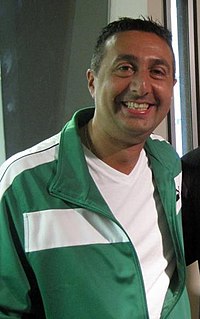A Quote by Sara Paretsky
These events are swirling around them. In the white community, people felt like they had no control over their neighborhoods, their destiny. In the black community, centuries of government and economic forces were pushing on them. I went in with a kind of arrogance, maybe, that came from living in a very intellectual family, and I left knowing that there was a lot about the way people lived that I didn't know about.
Related Quotes
I came to the realization that I had failed in some respects because I had been more of a benevolent narrator than the world I saw reflected around me, and in the lives of the people in my community, and in my family. There was no benevolent God sparing us pain and loss and grief and struggle. If I was going to continue to write about the place where I am from, and the kind of people who live in my community and who are in my family, I owed it to them to be honest with what our lives are like.
Twitter was an alternative community for me. A different kind of community. I knew I was making people angry. But it didn't matter, they weren't my community. But the longer I was on Twitter and the more I came to know these people, to like and respect them, the more I could see the empathy and grief and sorrow they were expressing.
We always think of saints as these monks or nuns or popes or priests from centuries ago who were celibate or lived very quiet lives. Maybe we don't know a lot about a lot them but what I'm saying is the saints of the 21st century are gonna be regular people - people who've kissed other people. They're gonna be married people.
The strange thing about my life is that I came to America at about the time when racial attitudes were changing. This was a big help to me. Also, the people who were most cruel to me when I first came to America were black Americans. They made absolute fun of the way I talked, the way I dressed. I couldn't dance. The people who were most kind and loving to me were white people. So what can one make of that? Perhaps it was a coincidence that all the people who found me strange were black and all the people who didn't were white.
Most rappers are black men. If you're a black man, you owe something to the community that you came from. If you're rapping about the community that you came from, and you're romanticizing parts of it for the entertainment of people who don't look like you, you certainly owe something to the community.
You have to know the forces that are against you and that are trying to break you down. We talk about the problems facing the black community: the decimation of the black family; the mass incarceration of the black man; we're talking about the brutality against black people from the police. The educational system.
One of the facets of growing up the way I did, I never had the experience of being solely in the black community. Even my family, my mother is what they call Creole, so she's part French, part black, and grew up in Louisiana. It's a very specific kind of blackness that is different than what is traditionally thought of as the black community and black culture. So, I never felt a part of whatever that was.
I think that we need more economic-based solutions to the problems afflicting the Black community, and I think that that's a way to redefine affirmative action. I grew up with poor white people in West Virginia, and I know there's a culture of poverty. I know that I've seen white people perform exactly the same pathological forms of behavior as Black people do when they're systematically deprived, whether it's getting pregnant, doing drugs, dropping out of school, whatever we're talking about. I think that we should have affirmative action for poor white people too.
I hope that if the people who read my work encounter people in the real world who are like the characters that I write about, that maybe that might make them feel empathy for those people. I know it sounds idealistic in a way, but I do hope that my work maybe changes some minds, and that my work makes readers see people as human that maybe before they read my work they might not have seen as humans, and those people include me and my family and my kids, people in my community.
The short-range involves the long-range. Immediate steps have to be taken to reeducate our people into the, a more real view of political, economic, and social conditions in this country, and our ability in, in a self- improvement program to gain control politically over every community in which we predominate, and also over the economy of that same community as here in Harlem. Instead of all the stores in Harlem being owned by white people, they should be owned and operated by black people.


































